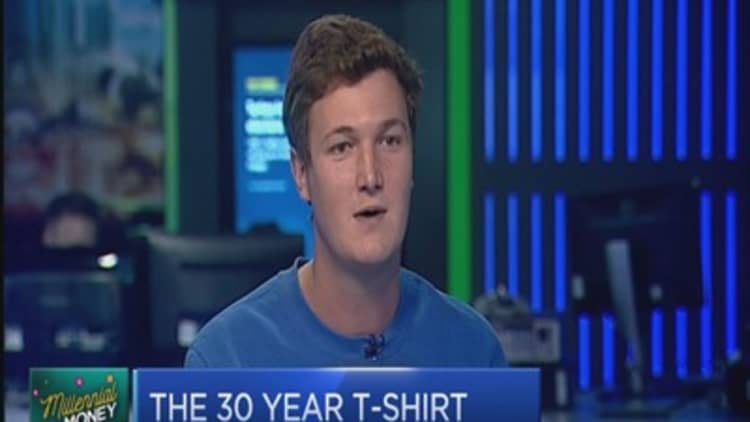Tom Cridland is nervous about next week.
The 25-year-old entrepreneur says a UK vote on whether to leave the European Union could destroy the business he has worked hard to build, and he's speaking out as the Brexit referendum draws closer.
Based in Cambridge, England, Cridland two years ago founded eponymous company Tom Cridland, which sells sustainable clothing and is perhaps best known for its "30 Year Sweatshirt." The company's apparel is manufactured by a Portuguese supplier and then imported to the UK. If the United Kingdom votes to leave the EU, Cridland fears that higher import tariffs could cripple his business.
The impact of a Brexit on his company is emblematic of the potential problems that could crop up for many small businesses in the UK that rely on imports. A split between the UK and the EU would scrap long-standing trade pacts between the United Kingdom and the European continent.
"We're very apprehensive and extremely worried that a potential Brexit could destroy our business," Cridland said. "If you start adding those import tariffs, and our markups don't work, then we go out of business."
Founded with the help of a small loan from the British government, Cridland says his business has grown to over £600,000 ($856,035) in annual sales. The company's signature sweatshirt costs about £40 ($57.07) to make and sells for £65 ($92.74).
According to Cridland, his company imports hundreds of thousands of pounds sterling worth of clothing from Portugal. But it's more than just the company's relatively affordable prices for "luxury" clothing that are on the line for Cridland. He is half-British and half-Portuguese, and says the very ethos of the brand is at stake.
Polls last week began to indicate a shift among UK voters toward leaving the European Union, but booking odds continue to show the "remain" camp as a majority. The shooting death of a Labour member of Parliament, Jo Cox, in Northern England on Thursday resulted in a temporary suspension of campaigning by both sides.

While the vote is a nonbinding referendum, it would almost certainly lead to the UK's eventual withdrawal from the EU and a need to renegotiate trade agreements. The high degree of uncertainty surrounding a potential Brexit has many economists fearful it will not just hurt the UK economy but also rock markets worldwide. Many Europe-watchers believe it could motivate other EU member states to withdraw from the trade block and possibly lead to the eventual end of the EU itself.
The "remain" camp has support from top political leaders including Prime Minister David Cameron and even President Barack Obama, Cridland says the "leave" camp has been more passionate in the debate. However, Cridland believes he has an important voice to lend as well.
"It's very important that we try and do our best to support the side of the argument that we believe in," Cridland said. "If you want to support many entrepreneurs in this country, I would vote to stay in the EU."
A May poll from research consultancy TNS found small businesses almost evenly divided over whether to leave the EU, while larger businesses are overwhelmingly in favor of staying.
Economists are divided on how a Brexit might affect small businesses in the UK. Jacob Kirkegaard, a senior fellow at the Peterson Institute for International Economics, said a Brexit would lead to severe trade disruption between the UK and the rest of the EU, with small businesses "suffering the most collateral damage."
"Tariffs will rise as a result if the UK drops out of the EU and simply becomes another (World Trade Organization) member," Kirkegaard said. "This will not be an amicable divorce — this will be a very messy, drawn-out and confrontational process."
Kirkegaard predicted a new trade deal between England the rest of the EU could take more than five years to complete. If the UK decides to leave the EU, under Article 50 of the Lisbon Treaty, the country would have two years to negotiate a new agreement before it would have to exit.
On the other hand, Peter Morici — a business professor at the University of Maryland and former chief economist at the U.S. International Trade Commission — said he does not see a large effect on small businesses generally, although apparel companies could see higher tariffs.
"Britain is going to remarkably adjust to this quite well," Morici said. He added that he thinks a new trade agreement will be relatively easy to negotiate.
"We know how to make those things work, and we know where the friction points are," Morici said. "We're not dealing with a society that's terribly protectionist."

